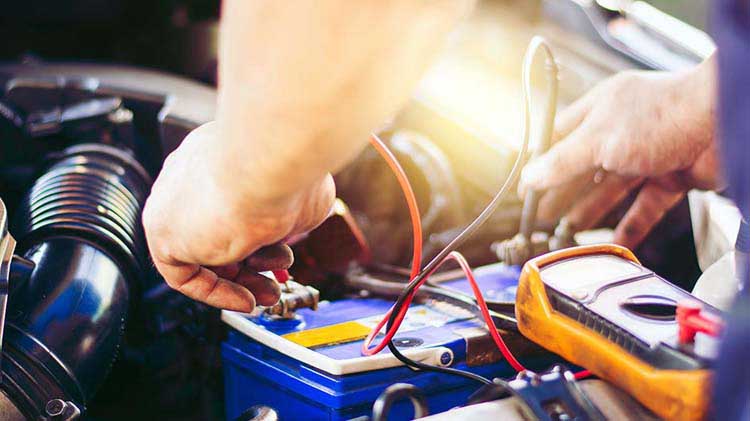Lithium Ion Battery: The Future of Energy Storage
Introduction:
In recent years, the demand for energy storage has increased significantly due to the growing reliance on renewable energy sources and the need to reduce greenhouse gas emissions. Among various energy storage technologies, lithium-ion batteries have emerged as a promising solution. This article will delve into the advantages, challenges, and future prospects of lithium-ion batteries as the future of energy storage.
Advantages of Lithium-Ion Batteries:
1. High Energy Density: Lithium-ion batteries have a high energy density, meaning they can store a large amount of energy in a relatively small and lightweight package. This makes them ideal for portable devices such as smartphones and electric vehicles (EVs), where compactness and weight are crucial factors.
2. Long Cycle Life: Lithium-ion batteries exhibit a long cycle life, which refers to the number of charge-discharge cycles a battery can undergo before its capacity significantly degrades. With proper usage and maintenance, lithium-ion batteries can last several years, making them cost-effective in the long run.
3. Fast Charging Capability: Compared to other battery technologies, lithium-ion batteries have a relatively fast charging capability. This is crucial for applications where quick charging is required, such as EVs, where minimizing charging time is essential to promote widespread adoption.
4. Environmental Friendliness: Lithium-ion batteries have a minimal environmental impact compared to traditional energy storage options. They do not emit greenhouse gases during operation, and the materials used in their construction can be recycled, reducing waste generation and promoting a circular economy.
Challenges and Potential Solutions:
1. Safety Concerns: One of the primary challenges associated with lithium-ion batteries is their safety. If not designed, manufactured, or used correctly, lithium-ion batteries can overheat, catch fire, or explode. However, extensive research and development efforts are continuously being made to improve battery safety through advanced thermal management systems, enhanced electrode materials, and better battery management systems.
2. Limited Availability of Raw Materials: Lithium-ion batteries require specific raw materials, such as lithium, cobalt, and nickel. The limited availability and geopolitical concerns associated with these materials pose challenges to the widespread adoption of lithium-ion batteries. However, researchers are exploring alternative materials and battery chemistries to overcome these limitations.
3. Cost: Despite significant advancements, lithium-ion batteries still remain relatively expensive compared to conventional energy storage options. However, the continuous improvement in battery technology and the scaling up of production are expected to drive down costs in the future, making lithium-ion batteries more economically viable for various applications.
Future Prospects:
The future of energy storage heavily relies on the development and advancement of lithium-ion batteries. As technology continues to evolve, it is expected that lithium-ion batteries will become even more efficient, safer, and affordable. Several key areas of development include:
1. Increased Energy Density: Researchers are working on developing battery chemistries that can store even more energy, allowing for extended ranges in electric vehicles and longer-lasting portable devices.
2. Faster Charging: Efforts are being made to enhance the charging speed of lithium-ion batteries further. This will reduce the time required to charge electric vehicles and make portable devices more convenient for users.

3. Improved Safety: The focus on battery safety will continue, with advancements in thermal management systems, solid-state electrolytes, and the overall design of lithium-ion batteries, ensuring safer operation and reducing the risk of accidents.
4. Sustainable Materials: To overcome the limitations posed by the availability of raw materials, researchers are exploring alternative materials and chemistries that are abundant, environmentally friendly, and economically viable.
Conclusion:
Lithium-ion batteries have emerged as a frontrunner in the field of energy storage, offering a range of advantages such as high energy density, long cycle life, fast charging capability, and environmental friendliness. Despite facing challenges such as safety concerns, limited availability of raw materials, and cost, ongoing research and development efforts are expected to address these issues and pave the way for an even brighter future for lithium-ion batteries. With continuous advancements, lithium-ion batteries will play a pivotal role in enabling the transition to a sustainable and clean energy future.
-
 Lithium-ion batteries are widely used in electronic devices such as smartphones, laptops, and electric vehicles due to their high energy density and longer lifespan compared to other battery types. Charging a lithium-ion battery with a power supply is a simple process, but it requires caution to avoid damaging the battery or causing a safety hazard. In this article, we will...Læs mere
Lithium-ion batteries are widely used in electronic devices such as smartphones, laptops, and electric vehicles due to their high energy density and longer lifespan compared to other battery types. Charging a lithium-ion battery with a power supply is a simple process, but it requires caution to avoid damaging the battery or causing a safety hazard. In this article, we will...Læs mere -
 In recent years, the demand for efficient and durable power solutions has significantly increased due to the rapid development of technology and the growing need for renewable energy sources. Among the many battery options available in the market today, the 3.2V LiFePO4 battery stands out as an ideal power solution for various applications. The 3.2V LiFePO4 battery is a...Læs mere
In recent years, the demand for efficient and durable power solutions has significantly increased due to the rapid development of technology and the growing need for renewable energy sources. Among the many battery options available in the market today, the 3.2V LiFePO4 battery stands out as an ideal power solution for various applications. The 3.2V LiFePO4 battery is a...Læs mere -
 Når det kommer til motorcykler, er kraft, hastighed og pålidelighed nøglen. Derfor er det så vigtigt at vælge det rigtige batteri til din tur. LiFePO4 motorcykelbatterier vinder hurtigt popularitet som en højtydende og langtidsholdbar mulighed for ryttere. Hvad er LiFePO4? LiFePO4 står for lithium iron phosphate, som er en type lithium-ion batteri. LiFePO4-batterier er kendt...Læs mere
Når det kommer til motorcykler, er kraft, hastighed og pålidelighed nøglen. Derfor er det så vigtigt at vælge det rigtige batteri til din tur. LiFePO4 motorcykelbatterier vinder hurtigt popularitet som en højtydende og langtidsholdbar mulighed for ryttere. Hvad er LiFePO4? LiFePO4 står for lithium iron phosphate, som er en type lithium-ion batteri. LiFePO4-batterier er kendt...Læs mere -
 Portable jump starter battery packs are a must-have for anyone who drives a car. These battery packs are designed to provide an emergency power source to jump start your car when your battery dies. They are compact, lightweight, and easy to carry around in your car, making them perfect for long road trips, camping trips, or just for everyday use....Læs mere
Portable jump starter battery packs are a must-have for anyone who drives a car. These battery packs are designed to provide an emergency power source to jump start your car when your battery dies. They are compact, lightweight, and easy to carry around in your car, making them perfect for long road trips, camping trips, or just for everyday use....Læs mere -
 For those who love to have outdoor adventures, a reliable power source is a must-have. In the past, people had to rely on gasoline generators to provide power when they were in the wilderness. However, the advent of emergency starter batteries has revolutionized the way we power our devices during an emergency situation. An emergency starter battery is a...Læs mere
For those who love to have outdoor adventures, a reliable power source is a must-have. In the past, people had to rely on gasoline generators to provide power when they were in the wilderness. However, the advent of emergency starter batteries has revolutionized the way we power our devices during an emergency situation. An emergency starter battery is a...Læs mere -
 In the world of renewable energy, the search for reliable and long-lasting power sources is always ongoing. One such power source that has been gaining popularity in recent years is the 100Ah 12V LiFePO4 battery. This type of battery is considered to be a breakthrough in battery technology due to its advantages over traditional lead-acid batteries. The 100Ah 12V...Læs mere
In the world of renewable energy, the search for reliable and long-lasting power sources is always ongoing. One such power source that has been gaining popularity in recent years is the 100Ah 12V LiFePO4 battery. This type of battery is considered to be a breakthrough in battery technology due to its advantages over traditional lead-acid batteries. The 100Ah 12V...Læs mere -
 Marine batteries are a crucial component of any boat. They power the engine, electronics, and lights, and without them, your vessel won't get very far. However, like all batteries, marine batteries can run out of juice, leaving you stranded in the middle of the water. In these situations, it's important to know how to crank your marine battery so that...Læs mere
Marine batteries are a crucial component of any boat. They power the engine, electronics, and lights, and without them, your vessel won't get very far. However, like all batteries, marine batteries can run out of juice, leaving you stranded in the middle of the water. In these situations, it's important to know how to crank your marine battery so that...Læs mere

